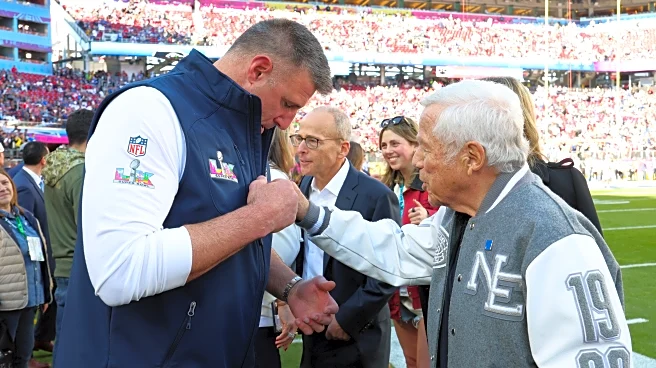What's Happening?
The Buffalo Bills chose not to engage in any trades during the 2025 NFL trade deadline, despite initial interest in acquiring Washington Commanders wide receiver Deebo Samuel and reuniting with pass rusher Von Miller. The decision to stay put was influenced
by the steep price tags associated with these players, which were deemed too high for the Bills. The team identified wide receiver and pass-rush depth as their primary needs but decided against pursuing trades, partly due to the activation of Gabe Davis to the practice squad, who could soon join the active roster. Additionally, the Bills are hopeful that injured defensive players will recover and bolster their pass rush capabilities.
Why It's Important?
The Bills' decision to refrain from making trades at the deadline highlights the team's strategic approach to managing their salary cap and roster depth. By not acquiring new players, the Bills are relying on internal development and recovery from injuries to address their needs. This move could impact their competitiveness in the AFC, as other teams like the Indianapolis Colts made significant trades to strengthen their rosters. The Bills' choice reflects a cautious approach, prioritizing financial stability and long-term planning over immediate roster enhancements.
What's Next?
Looking ahead, the Buffalo Bills will focus on integrating Gabe Davis into the active roster and monitoring the health of their defensive players. The team will aim to maintain their strong performance in the NFL, relying on existing talent and strategic management of resources. The decision not to trade could lead to increased pressure on current players to perform and fill the gaps identified by the team. The Bills will continue to evaluate their roster needs and may consider future trades or adjustments as the season progresses.
Beyond the Headlines
The Bills' decision not to engage in trades at the deadline may have broader implications for their strategy in the NFL. This approach could signal a shift towards valuing financial prudence and internal development over aggressive acquisitions. The team's reliance on recovering players and practice squad promotions may foster a culture of resilience and adaptability. Additionally, this decision could influence other teams in the league to reconsider their trade strategies, emphasizing the importance of balancing immediate gains with long-term sustainability.















